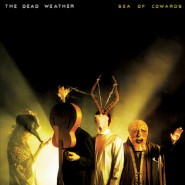 The Dead Weather
The Dead WeatherSea of Cowards
Score: 77
Jack White’s newest album, Sea of Cowards, is his second with side project The Dead Weather, released just under a year after the group’s debut, Horehound. The band’s sophomore album uses the same members, leading to the same sort of musical makeup as was demonstrated in Horehound, but with a definite progression from that album which itself, especially given the experience of everyone involved, was ultimately disappointing. Sea of Cowards isn’t perfect; however, it’s significantly better than Horehound, and it does a much better job at demonstrating the skill of White’s Dead Weather.
Taking a cue perhaps from noise music, Sea of Cowards is defined by strangely structured cacophony. Drums, voice, electric guitar, and synth, all excellent on their own, seem to be trying to forge their own paths, yet in one way or another, everything links together, thus somehow still creating a powerful, captivating track. While the whole while maintaining a dense array of somehow not-quite-conflicting sounds, Sea of Cowards ranges between being surprisingly controlled and completely out of control, sometimes in a single track (such as the fittingly titled “I’m Mad”).
On Sea of Cowards, Alison Mosshart is once again responsible for lead vocals, while White takes a backing position - but one that is at least somewhat less in the background than it was on Horehound. White’s rough country tones are given the chance to rip into the music when they take the foreground, while Mosshart’s almost equally strong voice provides the rest. Unlike Horehound, Sea of Cowards places each vocalist in the best place for their own sound. When everything goes perfectly, the two vocalists swoop about each other, taking concerted jabs at the sound that provides Sea of Cowards with its energy - and even when it doesn’t, it still works very well.
As usual for White’s work, Sea of Cowards is relatively simple lyrically, but, as the lyrics aren’t really the focus of the music, that’s generally forgivable. Simplicity aside, on Sea of Cowards as much as Horehound, The Dead Weather tends to come up with the occasional genuinely interesting line or stanza - usually made even better by their combination with the music. One of Sea of Cowards’ best examples is the opening of “Hustle and Cuss,” where Mosshart sings “Knock on the door / And the door knocks back / The joke never go no further than that / Fire goes back inside the match / Back down the stack,” in just the kind of vibrantly odd depiction that makes Sea of Cowards so vivid.
The best aspect of Sea of Cowards is how amazingly well everything manages to fit together, despite enormous odds. That said, the effort put into each track does seem to dwindle as the album progresses. While much of Sea of Cowards is clearly thought out, and terrifically implemented, later tracks are simply not as creative, and even somewhat forgettable. Still, there is significantly more good than bad on the album.
Sea of Cowards is a somewhat strange album, and it definitely takes a certain mindset or openness of mind to completely appreciate, but it is worth it. The Dead Weather has definitely started taking advantage of its excellent makeup, and the odd interactions between the always excellent instruments and vocals alike, all trying to push and shove and make out on top, yet always ending up working together, result in some extremely interesting and unique music. Sea of Cowards is not perfect, but The Dead Weather should definitely continue to work out what is still missing.
This post is tagged 70-79, The Dead Weather